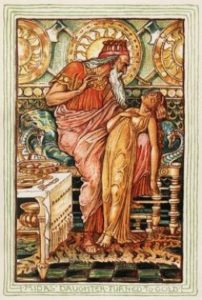The Curse of the Midas Touch

I wrote this story in the early ’90s and first published it online on squidoo.com in 2009.
I’ve always wondered what it would be like to live under the curse of the Midas touch, so when I heard that Midas himself was going to be in Los Angeles on business, I immediately called for an appointment to see him. His secretary, a cultured and soft-spoken gentleman, got right down to business.
“Proposal or consult?” he asked me.
“Huh?”
He sighed. “Are you making a business proposal to Mr. Midas, or do you wish to seek his advice in your own financial matters?”
“I want to talk to him about life.”
“Do you mean the magazine? I don’t think he’ll be interested.”
“I want to talk to him about life. Love. Work. Happiness. The meaning of everything.”
He chuckled softly. “I can assure you, Madam, that anything you say to me about the nature of your business will be held in the strictest confidence.”
I sighed. “Call it a personal consultation.”
He told me how much Midas charged for a 30-minute visit and scheduled my appointment.
Midas and his entourage were occupying almost half a floor at the Bonaventure. Costumed in one of my best dresses, and bringing the required fee, I went to his room. The man who took my money and ushered me in was probably the same one I had spoken to on the phone.
I sat in the vacant chair and looked across the desk at Midas. He was a tall, handsome, olive-skinned Greek. His breathing was a little halting, his suit slightly rumpled. The ashtray at his elbow was almost full of butts and he had another one going. They say that the eyes are the mirrors of the soul, but when I looked into his it didn’t look like they were reflecting much of anything.
“So,” I began, “are you enjoying your visit to the United States?”
“Oh, it’s been great!” He spoke English fluently, without an accent. “Some people badmouth Americans, but I think the people here are wonderful to deal with. They’ve been pure gold. I’ve made some really important connections.”
“Have you done any sightseeing?”
He chuckled. “You probably mean the Grand Canyon and stuff. Actually, dear, my idea of a scenic landmark is the NYSE, but I think it’s great that you guys have such a thriving tourism industry. And I think your environmentalists are really smart. You cut down a tree, you’re cashing in for the short term. But if you leave it standing, that tree’s gonna bring in tourist money year after year” — he paused, and then said softly to himself — “unless you could get people interested in paying to see tree stumps . . . then you’ve got your cake and you’re eating it, too . . . that could work.” He pulled out a scratch pad and wrote himself a note.
“Do you have a very heavy work schedule?” I asked him.
“I guess so, but I don’t think I could live any other way. And it hasn’t hurt me. People always tell me, ‘You better slow down, Midas,’ ‘The pace is gonna kill you, Midas.’ But if you ask me, I’m fine. I feel like a million bucks.” He lit another cigarette.
I looked at his gleaming, solid gold wedding band. “Tell me about your family.
He smiled. “My wife was a peasant girl in Greece when we met. She didn’t care about anything but cooking and going to dances back then, but she was smart as a whip. I knew she was the right one. And, of course, her outlook changed completely when I got my hands on her. She’s one of my vice-presidents now. She’s a treasure. We’ve got two kids; they’re both in college. Daughter’s taking Business Administration. Son’s taking Economics. Straight-A students. They’re jewels, both of them.”
“Do you have any hobbies?”
“I collect paintings.”
“That sounds exciting.”
“Oh, it’s terrific. My art guy just got me a new one at an auction last weekend. He says it should double in value within a few years.” He smiled again. “But anything I buy appreciates in value the minute I get it. It’s almost spooky.”
“Describe the painting.”
“It’s a Monet, I think.”
“You haven’t seen it?”
“No, but my art guy told me that it’s in mint condition, so I won’t need to look at it myself. and I’ve got a state-of-the-art vault, so I know it will stay in mint condition until it’s time to sell it.”
“It’s been good talking with you,” I said picking up my purse.
He looked completely bewildered. “That’s it? Uh, it’s been . . . interesting. Thank you.” He reached out to shake my hand. I smiled sweetly and kept my hands in my lap.
“Have a good life, Mr. Midas.” I got up and strolled out of the office.
The secretary looked up as I passed. “Madam, you still have twelve minutes that you’ve paid for.”
But by then I was halfway out the door.
When I got out onto the street I took a long, deep breath and looked around. A young man was slowly walking up and down the street with two cameras around his neck, taking carefully focused photographs of the buildings and of people passing by.
“You getting paid for that?” I asked him.
He laughed. “Nah. Just a hobby.”
I smiled and let him take my picture. Then I got in my Volkswagen, loosened my belt, kicked off my shoes, and headed for the ocean as fast as I could.